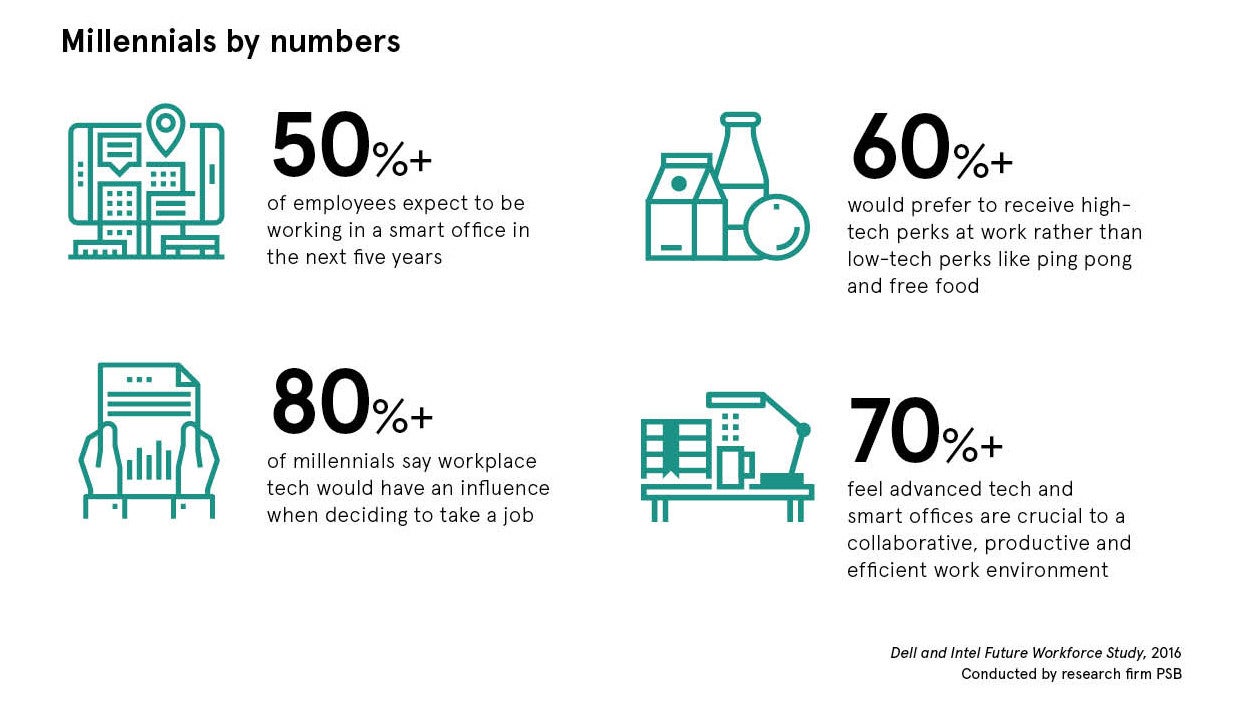 Millennials make up more than 35 per cent of the UK workers and are set to represent 50 per cent of the global workforce by 2020. Characterised by their desire to both work and consume services flexibly, millennials expect the user experience they enjoy on their smartphones and social networks in all aspects of their life.
Millennials make up more than 35 per cent of the UK workers and are set to represent 50 per cent of the global workforce by 2020. Characterised by their desire to both work and consume services flexibly, millennials expect the user experience they enjoy on their smartphones and social networks in all aspects of their life.
As millennials reach an age where they rely more on legal services, many are discovering that law firms aren’t meeting those expectations. Some 30 per cent of millennials who have had a legal issue say they prefer to use technology to share legal documents with their lawyer, compared to 23 per cent of older clients, according to the 2017 Legal Trends Report by Clio, the world’s leading legal practice management platform.

What once seemed like a wish-list of irreconcilable demands is now a prerequisite for survival in the modern legal landscape. Clio began transforming the legal space with the rise of cloud computing, which enabled a smarter and more efficient option. With powerful solutions made accessible and affordable, firms that have adopted the technology are disrupting an industry filled with unresponsive, traditional law firms.
We believe technology will continue to transform and redefine the legal practice
Legal solutions have traditionally been designed and improved in silos, but cloud technology makes it easier for different tools to integrate with one another, enabling legal professionals to craft technology ecosystems that work for them.
Clio’s platform, which with a 150,000-strong customer base is used in more than 90 countries, currently integrates with 18 leading UK legal apps and services thanks to an open application programming interface or API platform that allows applications to interact.
“We believe technology will continue to transform and redefine the legal practice, and we want to provide a fertile ground upon which additional innovation can occur,” says Jack Newton, chief executive and co-founder of Clio. “We want the Clio platform to be the first place developers look to build innovative legal technology tools. In turn, we know this will benefit our customers, who will gain a competitive edge from the full breadth of creativity and innovation in the tech industry.”
To provide the mobile services that millennial clients crave, law firms must embrace cloud-based practice management, with integrated document management and accounting tools. It’s clear that those who continue to use legacy systems, which require lawyers to be in the office, will be increasingly limited in how and where they can provide their services.

After ten years of practising law, Rachel Roche set up her own law firm in 2011 with a vision to modernise the way private client solicitors do business, focusing on offering personable service with a modern edge. Initially running the business from home, she relied on cloud services such as Dropbox for storing files and Xero for accounting.
As the business grew, Ms Roche required software that better organised her cases, contacts and files, while keeping better track of her billable time. With Clio’s solution, she could access everything wherever she was, from any device. “If I am on the road and take a
last-minute appointment, I don’t have to worry about not having the file with me,” she says. “I’ve always lived by the mantra that organisation is the key and Clio helps me with this.”
Stephen C. Paul, a millennial law firm owner and another Clio customer, adds: “I grew up on computers and, while a lot of my clientele is older than me now, very shortly the majority will be millennials too. We’re used to using a computer to find an answer immediately. Sometimes we don’t want to call anyone on the phone. We just want to send a quick message, or log in to something quickly, and get the information we want straight away.”
Cloud technology allows law firms to remove the hindrances of outdated processes. Scotland-based law firm owners Emma Reid and Cathy Donald, for example, use timers in Clio to keep a digital record of their billable hours, allowing them to provide clearer invoices for their clients.
“If you are time-recording by hand, you just don’t capture it all,” says Ms Donald. “I think you actually underestimate the amount of time it takes you to do something and it’s impossible to know how much value you’re getting back from the fees you’re issuing if you don’t know how much time you’ve spent on something.”
Ms Reid adds: “Clio makes the whole process with our clients and the conversations we might have with them in terms of procedure much easier. I feel more relaxed because I know there’s a record of all the time I’ve spent. And if there are concerns about fees, I can show clients where my time has gone.”
Alongside the demand for more effortless, technology-based interactions with law firms, millennials expect the sensitive information they share to be secure. Not only are many traditional law firms lagging behind in adopting cloud technology and providing the services millennials desire, they are also failing to do enough to protect themselves and their clients from cyber-threats. The cybercrime landscape is evolving at a daunting pace so lawyers must constantly be educating themselves to protect their business and their clients from online threats.
Simple economies of scale have led cloud computing vendors to invest aggressively in security infrastructure that is orders of magnitude more secure than what a
small-to-medium-sized law office would be able to invest in to protect on-premise servers. Analyst firm Gartner expects that through 2020 public cloud infrastructure-as-a-service (IaaS) workloads will suffer at least 60 per cent fewer security incidents than those in traditional datacentres.
“While there were some initial doubts over the security of the cloud back in 2008, especially among lawyers, it’s now accepted that the cloud is more secure than on-premise solutions,” says Mr Newton. “Clio spends hundreds of thousands of dollars each year on security, penetration testing, a dedicated security team and much more to make sure all client data is secure.”
For more information please visit clio.com/uk



